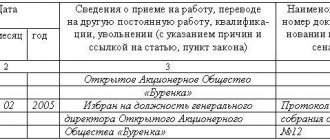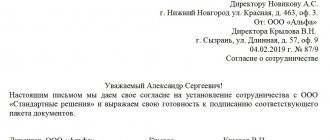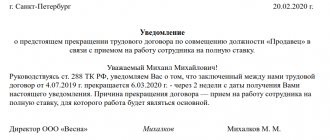In some cases, the employer may be required to draw up a letter of guarantee for employment; this action may be required if a convicted person is hired for parole at the workplace. Often a document is drawn up when a foreign worker is registered as a member of the staff.
In some cases, such a document is written when a graduate of an educational institution is accepted into an organization. Samples of document writing in various cases can be downloaded below.
You can download samples of a letter of guarantee for employment of a convicted person on parole, a foreign worker, or a student for 2021 for free at the bottom of the article.
What is a letter of guarantee for employment?
The document in which the employer undertakes to hire the applicant is called a letter of guarantor .
It stipulates the employee’s working conditions, his salary, bonuses and various social benefits.
The date or time period of official employment is also indicated.
The employee's return to work is indicated by a specific date, or a period may be set after some event. For example, a week after arrival.
What kind of document is this?
A letter of guarantee is an official document . At the legislative level, the recruitment of citizens and their employment are considered in the Labor Code in articles 65, , , 327 - registration for work, conditions of admission, responsibilities and requirements.
A letter from the employer in the case of parole obliges to accept the employee after judicial procedures to the workplace assigned to him, even if an employment contract has not been drawn up.
The letter will come in handy if the obligations of both parties (the employee and the employer) are not fulfilled , or the working conditions are not met - then on its basis you can go to court on behalf of the plaintiff to prove the case. The defendant in this case can be either the employer (who did not enter into an employment agreement) or the employee himself (who violated the labor obligations of the work contract). You can find out how to write a letter about the fulfillment of obligations under a contract here.
ATTENTION! The drafting of the letter is aimed at the future action of the employer and employee, which is consistent with the text of the document itself. From the legal side, the letter represents an obligation from the employer to hire an employee and provide him with a job.
Read more about what a letter of guarantee is here, and you can find out about legislative acts and the legal force of the document here.
Why is it needed?
Thus, anyone looking for a job in another city must ask the employer for this document . However, in some situations, paper from a guarantor is not only desirable, but necessary. Let's consider these cases in more detail.
- Citizens entering the Russian Federation or leaving the country for the purpose of work are required to present this certificate.
In the case of a visa regime, the guarantor’s notification is sent to the consulate, along with other papers. Citizens of neighboring countries show their work invitation at the border. - A prisoner who has served two-thirds of his sentence has the right to seek early release.
To do this, he needs to write an application, to which must be attached a guarantee notice from the employer. Searching for a place of employment and requesting a certificate is carried out through the employment center. - Hiring a future graduate of a university or technological college who has undergone work practice at the institution.
The student asks for a guarantee if he agrees to work at the place of internship. - Citizen participation in the state resettlement program. In this case, the employee has the right to demand written confirmation guaranteeing his employment at his new place of residence.
Important! If an employer avoids providing guarantees in every possible way, you should think about his integrity.
Letter of guarantee for employment of a convicted person
Separately, it is worth mentioning the letter of guarantee of employment for parolees and the certificate of employment for citizens released on parole.
These documents are issued by an organization that guarantees the person’s employment after release..
They are printed on the organization’s letterhead with a seal (either as a certificate or as a letter of guarantee) and addressed to the court at the location of the colony.
These documents should convince the judge that the person will be employed immediately upon leaving the camp and will not be forced to commit a crime again.
Letter of guarantee for employment of a convicted person, sample for parole.
Below is an example document:
Certificate of employment for parole, sample.
An example for reference below:
Sample application for parole from serving a sentence
Author: Anatoly Antonov, April 8, 2021 at 08:31 pm According to Article 175 of the Criminal Executive Code, a convicted person to whom parole may be applied, as well as his lawyer (legal representative) have the right to apply to the court with a request for probation -early release from serving a sentence.
The petition must contain information indicating that for further correction the convicted person does not need to fully serve the sentence imposed by the court, since during the period of serving the sentence he compensated for the harm (in whole or in part) caused by the crime, repented of the committed act, and may also be contained other information indicating the correction of the convicted person. The convicted person submits a petition for conditional early release from serving his sentence through the administration of the institution or body executing the sentence in which the convicted person is serving his sentence in accordance with Article 81 of this Code. The administration of the institution executing the sentence in which the convict is serving his sentence in accordance with Article 81 of this Code, no later than 15 days after the submission of the convict’s petition for conditional early release from serving the sentence, sends the said petition to the court along with the characteristics of the convict. The characterization must contain data on the behavior of the convicted person, his attitude to study and work during the entire period of serving the sentence, the attitude of the convicted person to the committed act, compensation for the harm caused by the crime, as well as the administration’s conclusion on the advisability of parole. The characteristics of a person who is convicted of committing a crime against the sexual integrity of a minor under fourteen years of age over the age of 18, and who is recognized on the basis of a forensic psychiatric examination as suffering from a disorder of sexual preference (pedophilia), which does not preclude sanity, must also contain data about the compulsory medical measures applied to him, about his attitude towards treatment. Simultaneously with the petition of such a convicted person for conditional early release from serving his sentence, the conclusion of his attending physician is sent to the court. If there is a copy of the court ruling or order in the personal file of the convicted person to notify the victim or his legal representative, the administration of the institution executing the punishment shall send it to the court, and also provide information about the place of residence of the victim or his legal representative and other information ensuring their timely notification, If there are any. A convicted person for whom the unserved part of the sentence may be replaced with a more lenient punishment, as well as his lawyer (legal representative), have the right to apply to the court with a petition to replace the unserved part of the punishment with a more lenient punishment. The convicted person submits a petition to replace the unserved part of the sentence with a milder type of punishment through the administration of the institution or body executing the sentence in which he is serving the sentence in accordance with Article 81 of this Code. The administration of such an institution or body, no later than 10 days after filing a petition from a convicted person to replace the unserved part of the sentence with a more lenient punishment, sends the said petition to the court along with a reference to the convicted person. The characterization must contain data on the behavior of the convicted person, his attitude to study and work during the entire period of serving the sentence, on the attitude of the convicted person to the committed act and that the convicted person partially or fully compensated for the damage caused or otherwise made amends for the harm caused as a result of the crime . The characteristics of a person who, based on the conclusion of a forensic psychiatric examination, is recognized as suffering from a disorder of sexual preference (pedophilia), which does not exclude sanity, and who is convicted of committing, at the age of over 18 years, a crime against the sexual integrity of a minor under fourteen years of age, must also contain data on compulsory medical measures applied to the convicted person, on his attitude towards treatment. Simultaneously with the petition of such a convicted person, the conclusion of his attending physician is sent to the court. If there is a copy of the court ruling or order in the personal file of the convicted person to notify the victim or his legal representative, the administration of the institution executing the punishment shall send it to the court, and also provide information about the place of residence of the victim or his legal representative and other information ensuring their timely notification, If there are any. The administration of the institution executing the sentence in which the convicted person is serving his sentence in accordance with Article 81 of this Code, in accordance with part four of Article 113 of this Code, submits to the court a proposal to replace the unserved part of the sentence with a more lenient type of punishment in relation to a positive convicted person. The proposal to replace the unserved part of the sentence with a milder type of punishment must contain data on the behavior of the convicted person, his attitude to study and work during the entire period of serving the sentence, on the attitude of the convicted person to the committed act and that the convicted person has compensated for the harm (in whole or in part) caused by a crime. In a proposal to replace the unserved part of the sentence with a more lenient punishment for a person who was convicted of committing a crime against the sexual integrity of a minor under fourteen years of age over the age of 18, and was recognized on the basis of the conclusion of a forensic psychiatric examination as suffering from a disorder of sexual preference (pedophilia) , which does not exclude sanity, must also contain information about the compulsory medical measures applied to him, about his attitude towards treatment. Simultaneously with the presentation of such a convicted person, a report from his attending physician is sent to the court. If there is a copy of the court ruling or order in the personal file of the convicted person to notify the victim or his legal representative, the administration of the institution executing the punishment shall send it to the court, and also provide information about the place of residence of the victim or his legal representative and other information ensuring their timely notification, If there are any. The procedure for applying the amnesty is determined by the body that issued the amnesty act. A convicted person who has developed a mental disorder that prevents him from serving his sentence, or his legal representative, has the right to petition the court to release the convicted person from further serving his sentence in accordance with Article 81 of the Criminal Code of the Russian Federation. A petition for release from further serving a sentence due to the onset of a mental disorder is submitted by the convicted person or his legal representative through the administration of the institution or body executing the sentence. If it is impossible for the convicted person or his legal representative to independently apply to the court, a motion to release the convicted person from further serving the sentence due to the onset of a mental disorder is submitted to the court by the head of the institution or body executing the sentence. Simultaneously with the said petition or presentation, the conclusion of the medical commission and the personal file of the convicted person are sent to the court. A convicted person who has fallen ill with another serious illness that prevents him from serving his sentence has the right to petition the court to release him from further serving his sentence in accordance with Article 81 of the Criminal Code of the Russian Federation. A convicted person submits a petition for release from further serving a sentence due to a serious illness through the administration of the institution or body executing the sentence. If it is impossible for a convicted person to independently apply to the court, a motion to release the convicted person from further serving his sentence due to a serious illness is submitted to the court by the head of the institution or body executing the sentence. Simultaneously with the said petition or presentation, the conclusion of the medical commission or medical and social examination institution and the personal file of the convicted person are sent to the court. In cases where a person sentenced to compulsory labor or correctional labor is recognized as a disabled person of the first group, and a person sentenced to forced labor as a disabled person of the first or second group, he has the right to apply to the court with a petition for early release from further serving the sentence. List of diseases that prevent the serving of a sentence, the procedure for sending for a medical examination of convicts applying for release (submitted for release) from serving a sentence due to illness, and the procedure for medical examination of convicts applying for release (submitted for release) from serving a sentence in connection with disease, approved by the Government of the Russian Federation. If pregnancy occurs, a woman sentenced to compulsory labor, correctional labor, or forced labor has the right to petition the court to defer her sentence from the date of granting maternity leave. If the court refuses conditional early release from serving a sentence or replaces the unserved part of the sentence with a more lenient type of punishment, the repeated submission of a corresponding petition or presentation to the court may take place no earlier than six months from the date of the court's decision on refusal. If the court refuses to release a person sentenced to life imprisonment on parole, a repeated application may take place no earlier than three years from the date of the court's decision on the refusal. The court's refusal to grant parole from serving the sentence does not prevent the court from submitting a proposal to replace the unserved part of the sentence with a more lenient type of punishment. Those released on parole and sentenced to restriction of freedom or forced labor in order to replace the unserved part of the sentence with a milder type of punishment, if they were sent to correctional institutions, correctional centers in cases provided for by law, may again apply for parole from serving the sentence or be submitted to replace the unserved part of the sentence with a more lenient punishment no earlier than one year from the date of the decision to revoke parole or replace a more lenient punishment with imprisonment. Thus, only the convicted person or his lawyer can file a petition for parole. Answer
How to write correctly?
The Labor Code of the Russian Federation (LC RF) does not stipulate a strict form for writing a surety bond, but there are some mandatory nuances. Failure to comply with these provisions will result in the paper being invalidated.
Despite the absence of a standard form, the form of a letter of guarantee for employment must comply with the following rules:
- registration takes place on a special form from the employer.
In the upper left corner of the sheet there is a serial number, as well as the date of its preparation.- The upper right corner is occupied by the recipient's address. In some cases, the phrase “at the place of requirement” is written in this place.
- The name is indicated in the middle of the sheet.
- Next comes the main text. It must include the name of the employer's organization, the applicant's position, his salary, and social guarantees. The dates or time periods of the employee’s return to work and employment are also indicated. Penalties imposed in the event of failure to fulfill the obligations of one of the parties are specified.
- At the end, the signature of the accountant and the manager, as well as the seal of the organization, is affixed.
Attention ! The signature of the company's accountant is optional, but desirable. It confirms the intention to pay the established salary. It is necessary to check the availability of the date of compilation.
The paper is valid for three years from the indicated date.
To give the obligation legal “weight” when drawing up the text, it is necessary to refer to the articles of the Labor Code of the Russian Federation. Depending on the destination of the document, different clauses will be required.
- Often in the warranty obligation there are references to Art. 65, 68 Labor Code of the Russian Federation. They describe the hiring process. They contain references to the required documents, including a letter of guarantee.
- A reference to Art. 64, which describes the right of an applicant to defend his employment in court.
Article 80 contains information about the termination of an employment contract and the role of the guarantee obligation in this case.- The list of everything necessary for foreign workers is given in Art. 327 clause 3 of the Labor Code of the Russian Federation.
- When registering an obligation with a graduate, you must refer to Art. 96 Labor Code of the Russian Federation.
Important! For a document to have legal force, references to the Labor Code of the Russian Federation are not enough. The text must contain the words: I guarantee, I undertake, I assure, and so on.
Below is an example document:
Sample: letter of guarantee of employment from the employer.
The photo shows the completed letter:
<
Results
Providing a guarantee by the future employer that he plans to employ the bearer of the letter of guarantee helps the latter to insure himself against troubles associated with the risk of non-employment. However, the employee cannot force the employer to issue such a letter.
The letter of guarantee is drawn up in free form, since there is no special form for issuing this document.
You can find more complete information on the topic in ConsultantPlus. Free trial access to the system for 2 days.
Does it have legal force?
Of course, this paper has legal force. But problems may arise when presenting it to the courts .
If the paper is drawn up correctly and all the nuances described above are met, the court is obliged to accept it as evidence. Otherwise, if there are violations, the decision rests with the judge.
A letter of guarantee is an important obligation that protects the rights of the employer and employee . It ensures that the employee conscientiously performs his duties, for which he receives the agreed benefits.
Delivery: description of the order
The procedure for delivering a letter of guarantee to the addressee
The document is transmitted to the addressee using different methods:
- through electronic means of communication;
- with the participation of a courier;
- in the form of a registered letter with acknowledgment of receipt.
The last two options are preferable for any citizen, since they provide a greater guarantee that the message will reach the addressee.
The blue seal and the organization stamp are elements without which a document cannot be recognized as official. Transmission of the original using paper is mandatory, even when the process is accompanied by the use of e-mail or fax.
About social guarantees
Social guarantees in a letter for employment
Social guarantees are associated with ensuring normal conditions for the continued existence of citizens. The main thing is that well-being, life and health do not suffer from negative influences.
What is expected in this direction:
- Providing for sick leave registration.
- Payment of travel expenses.
- Payments in case of professional injuries or illnesses.
- Compensation due to harmful, dangerous working conditions.
- Personnel labor protection.
In the collective labor agreement, the manager must describe everything related to social guarantees.
How can a convicted person find a job?
As already mentioned, one of the reasons for granting the specified person early release is the moment of employment. You can search for a job in two ways:
- Through the employment center (unemployment exchange);
- Direct search for an employer willing to provide work to a person released early.
In the latter case, the search is usually carried out by relatives or they turn to intermediaries who will act in the interests of the convicted person. Usually they write the petition. It is attached to the letter of guarantee.
It is in the package that these two documents will have a significant impact on the court in making a positive decision on the convicted person.
Additional certificates for parole in 2019
Above is a standard list of documents that will be useful to absolutely any convicted person applying for parole. However, in some cases other documents may be required. Eg:
Health certificate
It will come in handy if the convict suffers from any serious illness. You can obtain a certificate from the medical authority of the correctional institution.
Certificate about the difficult financial situation of the family
Are elderly parents receiving a meager pension or a disabled child in need of help waiting for the convicted person to be released? A certificate from social security will indicate the need for a breadwinner in the family.
Parents' health certificate
A medical certificate received by the parents of a convicted person at a district clinic serves as evidence of the need to care for relatives.
Wife's pregnancy certificate
If the wife of a convicted person is expecting a child, she can obtain a corresponding certificate from a gynecologist at her place of residence.
Letter writer and signatory
Such a letter, in the absence of a unified form, is drawn up by each enterprise in a free style, but containing basic information.
The document is approved by order and signed by the manager, as well as the chief accountant.
If you have a seal, it is acceptable to use it, but at the moment it is not required.
Sample of filling out a letter of guarantee.
Certificate of registration at the place of residence for parole in 2021
A certificate of “registration” is another important document that can facilitate the parole of a convicted person. Depending on the situation, this could be:
- A copy of the certificate of ownership of the apartment that belongs to the convicted person;
- Certificate from the passport office confirming the registration of the convicted person at the place of residence;
- A receipt from a spouse, relative or other person who undertakes to register the convicted person in their living space.
receipts
Characteristics of a convicted person for parole in 2019
Any positive characteristics of the convicted person can be attached to the application for parole. For example:
- Characteristics from the place of work or study;
- Characteristics from neighbors;
- Characteristics from the administration of the correctional institution in which the convicted person is serving his sentence, etc.
characteristics for parole
Note! As practice shows, the characteristics work especially well in the case of crimes due to negligence, as well as minor and moderate gravity.








